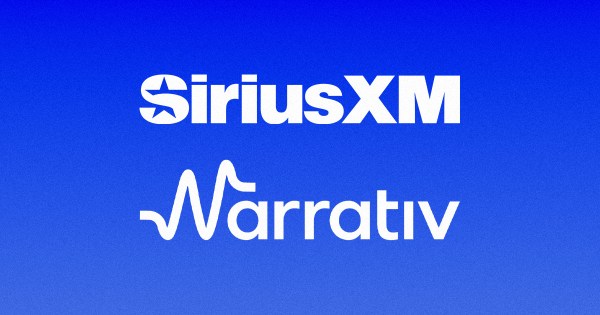SiriusXM Media has signed a multi-year agreement with artificial intelligence startup Narrativ to use voice replication technology in its audio ads, the company announced Tuesday at the Cannes Lions festival.
The deal enables the satellite and online audio platform to replicate voice actors’ performances and produce localized ad campaigns at scale—a move aimed at reducing production costs and turnaround times, according to Lizzie Collins, senior vice president of B2B marketing and ad innovation, SiriusXM Media.
As part of the deal, SiriusXM Media plans to integrate Narrativ’s voice technology into its self-service creative platform, AdMaker, allowing advertisers to generate audio ads with support from in-house agency Studio Resonate. The agency works with over 200 voice actors.
Financial details of the deal were not disclosed.
While audio accounts for 25% of time spent with media, it sees just 8% of ad investment, according to WARC’s 2024 report. One key barrier, Collins said, is the creative lift required to produce a range of audio assets, such as variations in voice, message, and creative to reach different audiences.
“A partnership like this can help us create scale and bring in new advertisers,” she said.
Previously, brands like Progressive have leveraged AI-powered audio ads to deliver more targeted messaging, reporting a 197% increase in quote requests.
However, the relationship between AI and the creative industry has been contentious in recent years, as artists raise concerns about their voices and likenesses being replicated without consent or compensation. In 2023, SAG-AFTRA, the union representing 160,000 film and television actors, went on strike after contract negotiations with studios broke down, with AI at the center of the dispute. The union also called a strike against video game companies over similar issues, citing demands for stronger protections and compensation around AI voice and image use.
Opt-in voice replication with creator control
Narrativ, which has signed an agreement with SAG-AFTRA to protect and monetize union talent voice replicas, requires voice actors to actively opt in before their voices can be replicated within ads, according to Benjamin Gottdiener, Narrativ’s co-founder.
Creators maintain control over where and how their voice is used, he said, with the ability to approve specific licensing scenarios for ads that run outside SiriusXM’s platform, review and approve each ad before use. This level of oversight, Gottdiener noted, is missing from many other AI voice tools, and aims to address industry concerns over synthetic content created without performer consent.
“AI voices are permissible when the proper consent, control, and compensation guidelines are followed. Consent is table stakes; control and compensation are the major sticking points in the industry today,” Gottdiener told ADWEEK.
The AI company also seeks to address concerns over underpayment, noting some players pay creators as little as 1% to 2% of total campaign revenue—a model Gottdiener views as unsustainable.
Still, nearly only half of the voice actors working with Studio Resonate have opted in or expressed interested in the program, according to Matt Mohun, vice president of creative services at Studio Resonate, acknowledging the ongoing hesitation among talent.
“AI is a complicated and probably perceived as a threatening technology in the creator network,” he said. “It’s the perception that AI can make their job redundant as well as using their voice without their permission.”
Scaling audio ads with per-use compensation
The deal allows SiriusXM to scale the production of audio ads by using a single voice performance to generate localized variations across markets. Rather than recording hundreds of versions manually, brands can tag out a base spot using Narrativ’s technology to generate localized variations.
“It’s a painful process for a voice actor to go through again only to be paid for that one spot,” Collins said. Automating that process is a “huge win” for creators, she noted, and “the turnaround time for advertisers is that much faster.”
Meanwhile, voice actors are compensated each time their replica is used, with payouts structured per spot, according to Mohun. Since SiriusXM supports both on- and off-platform campaigns, the comp rates vary based on usage.
However, the AI-generated audio ads will not carry any disclosure indicating they were created using synthetic voices, said Collins.
“There are no industry standards around if you have to disclose how you made the ad [yet],” she added, underscoring ongoing uncertainty about how and when brands should reveal the use of synthetic voices.



